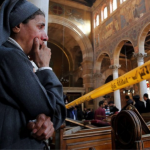By Yaroslav Trofimov – The Wall Street Journal –
Islamic State is a very resilient organization, it’s not one single group but a movement now
In the three years since it proclaimed a world-wide caliphate, Islamic State has become a global franchise—which means that the loss of its core in Syria and Iraq won’t pacify the far-flung conflict zones where the group’s affiliates operate.
Regional “provinces” of Islamic State have sprung up from West Africa to the Philippines after the group’s self-appointed “caliph,” Abu Bakr al-Baghdadi, seized the Iraqi city of Mosul in 2014 and demanded allegiance from Muslims world-wide.
Most of these “provinces” grew out of existing insurgent organizations, such as Nigeria’s Boko Haram or Ansar Beit al-Maqdis in Egypt’s Sinai Peninsula. These groups simply reflagged with Islamic State’s new brand—then seen as uniquely appealing to recruits and donors because of Islamic State’s seeming invincibility.
Other “provinces” were breakaways from relatively more moderate groups, such as Islamic State Khorasan, which absorbed the most violent elements of the Taliban in Afghanistan and Pakistan. Some groups, like Boko Haram, controlled huge territory. Other Islamic State “provinces,” such as the one in Russia’s North Caucasus, consisted of scattered militants on the run.
In any case, the conflicts in which all these “provinces” thrived preceded Islamic State’s 2014 proclamation. And even after the recent liberation of Mosul and the impending collapse of Islamic State’s second-largest stronghold of Raqqa, in Syria, these distant conflicts will persist, following their own individual dynamics.
“Operationally, the fall of Mosul changes nothing because every one of these groups is autonomous from Islamic State central,” said Mathieu Guidere, a terrorism expert at the University of Toulouse. “The only impact is psychological—these groups will fear that something like what happened to Mosul will happen to them, and will draw their lessons.”
In fact, just as Iraqi troops were mopping up the last pockets of resistance in Mosul, Islamic State’s Asian affiliate halfway around the world attempted a dramatic takeover of Marawi, one of the largest Muslim cities on the southern Philippines island of Mindanao. The battle there still goes on.
“Islamic State is a very resilient organization, it’s not one single group but a movement now,” said Rohan Gunaratna, head of the International Center for Political Violence and Terrorism Research at Nanyang Technological University in Singapore. “And because the world has no real strategy to contain, isolate and eliminate Islamic State beyond Iraq and Syria, we will see a significant global expansion of this group.”
Asia, home to many more Muslims than the Middle East, is a particular concern. “We should prepare for a Daesh pivot to Asia. Opportunities are limitless here because it is a very deep market,” said Richard Javad Heydarian, a security analyst in the Philippines, using an Arabic acronym for Islamic State. “Places like Mindanao are a perfect haven: borders are extremely porous and it’s easy to travel from Malaysia and Indonesia, while the depth of grievances of the Muslim minority in the southern region of the Philippines provides an ecosystem for extremism.”
While Islamic State—routed from much of its territory in Syria and Iraq—no longer has the winning momentum that once made it so attractive to potential jihadists, the organization has left a permanent mark on the motley assortment of militant groups that joined its caliphate project.
“Daesh has already done its damage, transforming the local groups ideologically and operationally,” said Muhammad Amir Rana, head of the Pakistan Institute of Peace Studies, a think tank focused on counterterrorism and security. “They have become ideologically more radical and have turned to more brutal attacks.”
One consequence of Islamic State’s losses in the Middle East may be a rekindled debate within the organization’s affiliates about just how indiscriminately brutal they should be. That issue has already split Boko Haram, currently known as Islamic State West Africa Province, with one faction treating anyone not actively aiding the group as apostates deserving death and another preaching more targeted violence against Christians and government officials.
In Pakistan, a recently formed group made up of disaffected Islamic State fighters, Ansar ul-Sharia Pakistan, has similarly rejected mass attacks targeting ordinary Muslims, focusing on assassinating police officers instead.
In trying to assess Islamic State’s global future after Mosul, terrorism experts and counterterrorism officials look for clues in what happened to al Qaeda after the loss of its Afghan base in 2001 and the killing of Osama bin Laden 10 years later. While these events significantly weakened al Qaeda’s core and reduced its ability to target the West, the group’s regional affiliates have flourished nevertheless—and marched on to victories in places such as northern Mali, Somalia and Yemen.
Niger parliament member Lamido Moumouni Harouna, who represents a region on the border with Nigeria that is frequently attacked by Boko Haram, said that he doesn’t expect his constituents to benefit from Islamic State’s demise in Mosul and Raqqa. “The conflict here is a local conflict,” he said. “And the way it will develop will depend on how the local environment develops.”
_________________
https://www.wsj.com/articles/beyond-syria-and-iraq-faraway-isis-provinces-fight-on-1500543000?mod=e2tw
Photo: A man rode past shuttered storefronts sprayed with pro-Islamic State graffiti in Marawi on the southern Philippines island of Mindanao on June 12. PHOTO: NOEL CELIS/AGENCE FRANCE-PRESSE/GETTY IMAGES





